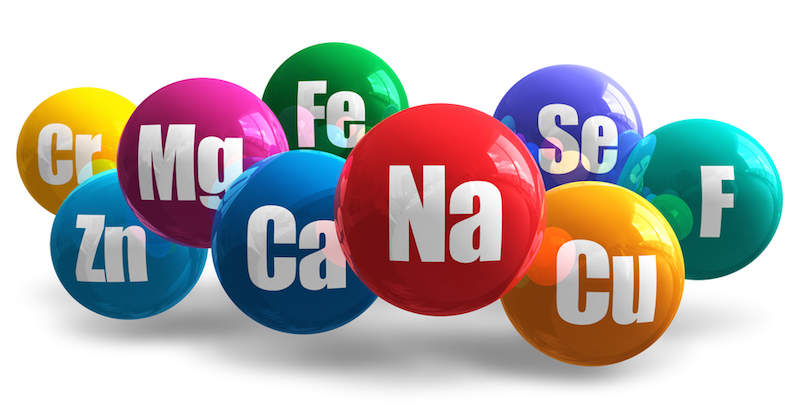Minerals play a key role in maintaining the health of the human body. They help maintain a large number of enzymatic and metabolic processes in the body. Food sources through which we can ensure a good intake of minerals are fish, meat, eggs, dairy products, nuts, cereals, vegetables, and fruits. Insufficient intake of micro- and macronutrients can lead to various health problems, so it is important to stick to a balanced diet and consume a variety of food daily. Adherence to a healthy lifestyle with a high intake of plant foods can provide us with important minerals such as copper, calcium, iron, magnesium, selenium, and others.
Why mineral intake is important
The intake of minerals is important because they have a key role in maintaining the health of the body. Minerals are necessary for building bones, to maintain the health of the skin, hair, and nails. They take part in the metabolism of macronutrients such as carbohydrates, fats, and proteins and regulate the functions of many organs and systems in the body. You should keep in mind that most minerals are needed by the body in relatively small quantities, so daily consumption should not exceed the recommended dosage.
Minerals: what are the main micro- and macroelements
Minerals are vital to our health and are involved in many biological processes. They are divided into microelements and macroelements, depending on the amount we need from them.
- Macronutrients include calcium, magnesium, phosphorus, sodium, potassium, and chlorine. They are needed in large quantities and have several important functions in the body, such as maintaining bone health, weight regulation, blood pressure control, and body fluid balance.
- Trace elements, on the other hand, include iron, zinc, copper, magnesium, selenium, iodine, molybdenum, cobalt, and chromium. They are needed in much smaller amounts but also have several important functions, such as participating in nutrient metabolism, maintaining immune system health, regulating nervous system functions, and maintaining skin and hair health.
It is important to take in enough minerals both micro and macronutrients to ensure the health of the body. Mineral deficiency can lead to various health problems such as weakness and fatigue, brittle bones, growth and development retardation, immune system disorders, and more.
Copper
Copper is a trace element that is found in foods such as oysters, whole grains, meat products, beans, and nuts. It is absorbed into the duodenum, processed in the liver, and enters the blood after binding to proteins such as ceruloplasmin or albumin.
During pregnancy, the need for honey increases because of its importance for embryonic development. Honey supplementation can reduce symptoms of depression and anxiety in the second and third trimesters. Honey deficiency is rare in babies, but it can occur in premature babies and infants who are recovering from malnutrition or acute diarrhea.
Copper is an important element for the metabolism of the human body. It is involved in numerous processes such as aerobic respiration, synthesis of neurotransmitters, collagen and melanin formation, antioxidant protection, and redox homeostasis. Copper interacts with iron and plays an important role in conditions such as Alzheimer’s disease, Parkinson’s, amyotrophic lateral sclerosis, and Huntington’s disease.
Manganese
Manganese is important for intracellular activity, participates in the metabolism of lipids, amino acids, and glucose, and maintains redox balance and immune response. Deficiency or excessive intake can lead to problems with mitochondria and metabolism, including insulin resistance, type 2 diabetes, atherosclerosis, and fatty liver disease. Manganese is important for women in terms of reproduction and fetal development, and deficiency or excessive intake of manganese can lead to infertility.
Manganese is absorbed mainly through food sources such as rice, nuts, whole grains, leafy green vegetables, and tea. An interesting fact is that women absorb a greater amount of manganese from their diet compared to men.
Manganese is crucial for intracellular activity because of its role as an enzyme activator for numerous enzymes, including those involved in lipid, amino acid, and glucose metabolism.
It contributes to maintaining the health of the mitochondria and reducing mitochondrial oxidative stress. The trace element is also necessary for processes such as digestion, reproduction, energy production, immune function, and neuronal activity, as well as for maintaining normal blood clotting.
Iron
Iron is an element that is important for many functions in the body and is a key component of various metabolic processes. One of the most important functions of iron is its participation in the synthesis of oxygen transfer proteins – hemoglobin and myoglobin.
In the diet, there are two forms of iron: heme and non-heme. Heme iron is found in animal sources and has a high bioavailability, which means it can be easily absorbed by the body. Nehem iron is found in plant sources and has very low bioavailability, which means it’s harder for the body to digest it.
Iron is essential for women’s health, especially during the menstrual cycle. Since most of the iron in the body is found in red blood cells, women need more iron than men. Insufficient iron intake can lead to iron deficiency anemia, which can cause fatigue, weakness, headaches, and other symptoms. A great way to ensure optimal iron intake is jelly vitamins with Iron – Frank Fruities Pump Iron Currant and apple.
Iodine
Iodine is extremely important for the proper functioning of the thyroid gland, which regulates the basic metabolism of the body. The trace element is absorbed into the duodenum and circulates in the blood, moving to the thyroid gland. If iodine intake is chronically low, the hypothalamus-pituitary-thyroid pathway is activated and begins to produce the thyroid-stimulating hormone, which leads to an increase in the thyroid gland. This can lead to hypertrophy of the thyroid gland.
Magnesium
Magnesium is an important mineral that is needed to maintain the health of bones, muscles, nervous system, and heart. It regulates blood glucose levels, supports immune system health, and is involved in DNA and RNA synthesis. Magnesium absorption is a complex process that occurs in the large intestine. Despite its presence in many foods, magnesium absorption is often difficult. Insufficient intake can lead to serious health problems, such as nervous disorders, muscle contractions, circulatory problems, and depression. Therefore, it is important to consume foods rich in magnesium and, if necessary, take magnesium supplements.
Zinc
Zinc is essential for health as it is one of the most important trace elements in the body. It is found in muscles and bones because it is a structural component of numerous proteins that catalyze the activity of enzymes. Zinc is needed for cell growth, supports immune system function, and contributes to connective tissue health. In addition, zinc plays an important role in the reproductive system, as it participates in spermatogenesis and supports the health of the reproductive organs. Jelly Vitamins with Zinc – Frank Fruities Build Immunity Elderberry and apple is a delicious and complete product that can provide you with the necessary amount of zinc daily.
Calcium
Calcium is an important mineral that performs numerous functions in the body. It is an essential structural component of bones and teeth and plays a role in maintaining their healthy growth and development. Calcium is also involved in many cellular processes, regulating muscle contractions, nerve conduction, and hormone secretion. The absorption of calcium depends on several factors such as vitamin D levels in the body, the acidity of gastric juice, physical activity, and age. The mineral is found in various food products such as milk, vegetables, fish, and nuts.
In conclusion
Minerals are needed by the human body in such small quantities that it is easy to ignore them. However, they are crucial for good health and help maintain basic enzymatic and metabolic processes. Adhering to a balanced diet and taking supplements are great options through which you can easily add to a healthy lifestyle. Combined products that provide optimal doses of essential minerals are the high-quality products from the Frank Fruities series: the jelly vitamins for female metabolism Frank Fruities Energy & Metabolism and the jelly vitamins with Selenium, Zinc, and Vitamin E – Frank Fruities Help Gut cherry, banana and apple.

